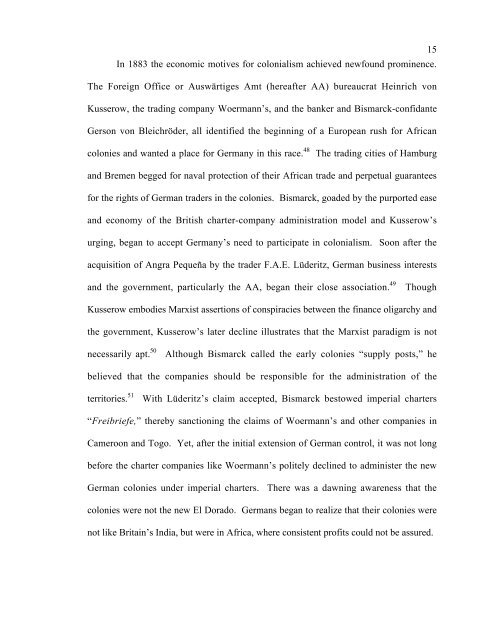A Deterritorialized History: Investigating German Colonialism ...
A Deterritorialized History: Investigating German Colonialism ...
A Deterritorialized History: Investigating German Colonialism ...
Create successful ePaper yourself
Turn your PDF publications into a flip-book with our unique Google optimized e-Paper software.
In 1883 the economic motives for colonialism achieved newfound prominence.<br />
The Foreign Office or Auswärtiges Amt (hereafter AA) bureaucrat Heinrich von<br />
Kusserow, the trading company Woermann’s, and the banker and Bismarck-confidante<br />
Gerson von Bleichröder, all identified the beginning of a European rush for African<br />
colonies and wanted a place for <strong>German</strong>y in this race. 48 The trading cities of Hamburg<br />
and Bremen begged for naval protection of their African trade and perpetual guarantees<br />
for the rights of <strong>German</strong> traders in the colonies. Bismarck, goaded by the purported ease<br />
and economy of the British charter-company administration model and Kusserow’s<br />
urging, began to accept <strong>German</strong>y’s need to participate in colonialism. Soon after the<br />
acquisition of Angra Pequeña by the trader F.A.E. Lüderitz, <strong>German</strong> business interests<br />
and the government, particularly the AA, began their close association. 49 Though<br />
Kusserow embodies Marxist assertions of conspiracies between the finance oligarchy and<br />
the government, Kusserow’s later decline illustrates that the Marxist paradigm is not<br />
necessarily apt. 50 Although Bismarck called the early colonies “supply posts,” he<br />
believed that the companies should be responsible for the administration of the<br />
territories. 51 With Lüderitz’s claim accepted, Bismarck bestowed imperial charters<br />
“Freibriefe,” thereby sanctioning the claims of Woermann’s and other companies in<br />
Cameroon and Togo. Yet, after the initial extension of <strong>German</strong> control, it was not long<br />
before the charter companies like Woermann’s politely declined to administer the new<br />
<strong>German</strong> colonies under imperial charters. There was a dawning awareness that the<br />
colonies were not the new El Dorado. <strong>German</strong>s began to realize that their colonies were<br />
not like Britain’s India, but were in Africa, where consistent profits could not be assured.<br />
15
















